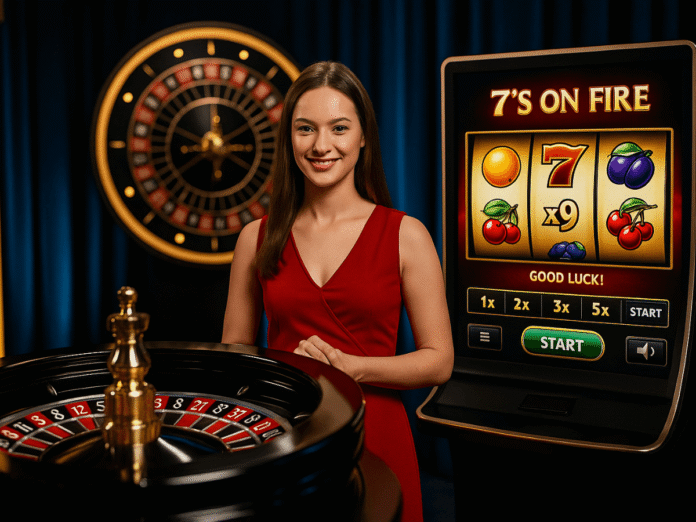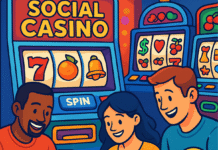In 2025, the intersection of technology and gaming is producing a new breed of casino experience: hybrid games, where the real-time human presence of live dealers meets the deterministic efficiency of Random Number Generators (RNG). This isn’t just hype — operators and software providers are actively rolling out formats that blur the lines between live and automated, capturing the best of both worlds.
In this article, we’ll explore what hybrid casino games are, why they’re appealing, how casinos are implementing them, real examples in the market, challenges they face, and where the trend may lead next.
What Are “Hybrid” Games?
Traditionally, online casinos have used one of two models:
- Live dealer games: a real human dealer streamed from a studio or casino, with physical cards or wheels determining outcomes.
- RNG (Random Number Generator) games: fully digital games, such as slots or virtual table games, where outcomes are determined by algorithms.
A hybrid game combines elements of both. You might see a “live” host, video of a table, or even a studio, but the actual result could be driven by an RNG system. The aim is to maintain trust, personality, and entertainment value while gaining scalability, flexibility, and lower costs.
These games create an experience that feels live but operates on digital logic — merging authenticity with reliability.
Why Casinos Are Embracing Hybrid Formats
1. Scalability and Cost Efficiency
Running live dealer studios is resource-intensive. Hybrid formats reduce that burden by using pre-recorded or semi-automated sequences supported by RNGs, cutting down on staffing, bandwidth, and operational costs.
2. 24/7 Availability
A pure live operation must schedule dealers and staff shifts. Hybrids, powered by software, can run around the clock while maintaining a “human” face, offering players nonstop access without downtime.
3. Human Presence Builds Trust
Players often prefer games that feel tangible. Even a pre-recorded or AI-generated dealer gives a sense of fairness and human connection, helping players feel comfortable and engaged.
4. Room for Creative Mechanics
Because part of the system is digital, developers can easily add bonus rounds, interactive side bets, and slot-style multipliers — elements impossible in a traditional table game.
5. Appeal to a Younger Audience
Modern players love dynamic visuals, gamified mechanics, and interactive interfaces. Hybrid games satisfy that desire by blending realism with game-show-like energy.
How Casinos Implement Hybrids
Pre-Recorded Dealers with RNG Cores
In this setup, dealers are filmed in advance performing actions like dealing cards or spinning a wheel. The software then uses RNG outcomes to select which clip plays next, matching the random result to the dealer’s actions. The presentation feels live, even though the outcome is purely digital.
Live Streams Enhanced by RNG

Here, a real live dealer hosts the game, but RNG determines certain events such as bonus triggers or multipliers. This lets casinos add features like “lucky numbers” or special effects on top of traditional live play.
Hybrid Game Shows
Some formats look more like entertainment programs than traditional casino tables. A host interacts with players while RNG modules control spinning wheels, multipliers, or challenges. The result is half live TV show, half interactive game.
Electronic Table Hybrids
Land-based casinos are also exploring this concept. Electronic table games (ETGs) already combine digital displays with real components; hybrid versions extend that further by linking RNG outcomes with on-screen dealer interactions or live-streamed footage.
Real Examples in 2025
Hybrid gaming isn’t a theory — it’s already happening:
- MGM Bonus City (BetMGM & Inspired Entertainment): A virtual “tour” of MGM properties where dealer footage, CGI, and RNG combine to create a seamless digital casino world.
- Hybrid Dealer Roulette (Inspired Entertainment): Uses filmed dealers and computer-generated settings to deliver live-feeling roulette powered by RNG outcomes.
- 7’s On Fire Live (Playtech): Blends a live roulette format with RNG-driven slot multipliers for extra excitement.
- EZ Marble Race Monaco (Ezugi / Evolution): A marble race “show” that combines pre-recorded visuals with RNG results determining which marble wins.
- IGT Hybrid Table Systems: Integrating live and digital components into ETGs, bridging the physical casino floor and online experiences.
These are just a few examples of how studios and operators are embracing the hybrid model.
Benefits and Challenges
Benefits
- Reduced costs — fewer live dealers and less studio space required.
- Constant uptime — no need for human scheduling.
- Immersive experiences — players get live-style interaction.
- Creative design — flexible, mix-and-match gameplay mechanics.
- Regulatory clarity — RNG outcomes are auditable and mathematically fair.
Challenges
- Maintaining Authenticity
If the hybrid presentation feels too artificial, players may lose confidence. Achieving a seamless, human-feeling experience takes careful design.
- Regulatory Ambiguity
Some jurisdictions have not yet clearly classified hybrid games. They may fall into grey areas between “live” and “digital” regulation.
- Synchronization and Technical Quality
RNG logic and video footage must align perfectly in real time. Lag or mismatches can break immersion.
- Player Perception
Transparency is crucial. Players should understand that while the presentation looks live, the result is determined by RNG logic.
- Content Refresh Needs
To prevent fatigue, developers must update dealer footage and game themes regularly — a costly creative challenge.
The Future of Hybrid Games
Looking ahead, hybrid gaming is likely to evolve rapidly over the next few years.
- AI-Generated Dealers: Artificial intelligence will enable lifelike virtual hosts capable of dynamic conversation and reactions, further blurring the line between real and synthetic.
- Blockchain Integration: Provably fair RNG systems on the blockchain could enhance transparency and player trust.
- AR and VR Casinos: Mixed-reality setups will let players interact with virtual dealers in immersive 3D environments.
- Persistent Game Worlds: Hybrids could evolve into live service ecosystems, with cumulative rewards, progression systems, and social features.
- Regulatory Evolution: As hybrid gaming matures, regulators will develop clearer frameworks to classify and certify these new formats.
Advice for Operators and Developers
- Start small with pilot markets before scaling globally.
- Prioritize transparency — explain how outcomes are generated.
- Keep the production quality high to sustain immersion.
- Refresh visual assets regularly to keep players engaged.
- Incorporate social elements and gamification.
- Work closely with regulators and testing agencies to ensure compliance.
Conclusion
Hybrid casino games are redefining the online gambling landscape in 2025. By merging the energy and atmosphere of live dealers with the precision and scalability of RNG technology, casinos are creating immersive, efficient, and endlessly creative experiences.
The fusion of live and digital formats isn’t just a passing trend — it’s a long-term transformation that’s reshaping how players interact with games of chance. As hybrid design continues to evolve, it promises a future where human connection and digital innovation coexist seamlessly on every spin, shuffle, and deal.
Sources:















